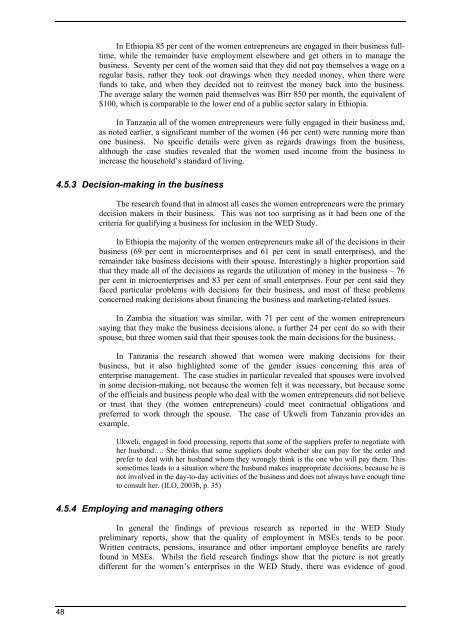The Challenges of Growing Small Businesses - International Labour ...
The Challenges of Growing Small Businesses - International Labour ...
The Challenges of Growing Small Businesses - International Labour ...
Create successful ePaper yourself
Turn your PDF publications into a flip-book with our unique Google optimized e-Paper software.
In Ethiopia 85 per cent <strong>of</strong> the women entrepreneurs are engaged in their business fulltime,<br />
while the remainder have employment elsewhere and get others in to manage the<br />
business. Seventy per cent <strong>of</strong> the women said that they did not pay themselves a wage on a<br />
regular basis, rather they took out drawings when they needed money, when there were<br />
funds to take, and when they decided not to reinvest the money back into the business.<br />
<strong>The</strong> average salary the women paid themselves was Birr 850 per month, the equivalent <strong>of</strong><br />
$100, which is comparable to the lower end <strong>of</strong> a public sector salary in Ethiopia.<br />
In Tanzania all <strong>of</strong> the women entrepreneurs were fully engaged in their business and,<br />
as noted earlier, a significant number <strong>of</strong> the women (46 per cent) were running more than<br />
one business. No specific details were given as regards drawings from the business,<br />
although the case studies revealed that the women used income from the business to<br />
increase the household’s standard <strong>of</strong> living.<br />
4.5.3 Decision-making in the business<br />
<strong>The</strong> research found that in almost all cases the women entrepreneurs were the primary<br />
decision makers in their business. This was not too surprising as it had been one <strong>of</strong> the<br />
criteria for qualifying a business for inclusion in the WED Study.<br />
In Ethiopia the majority <strong>of</strong> the women entrepreneurs make all <strong>of</strong> the decisions in their<br />
business (69 per cent in microenterprises and 61 per cent in small enterprises), and the<br />
remainder take business decisions with their spouse. Interestingly a higher proportion said<br />
that they made all <strong>of</strong> the decisions as regards the utilization <strong>of</strong> money in the business – 76<br />
per cent in microenterprises and 83 per cent <strong>of</strong> small enterprises. Four per cent said they<br />
faced particular problems with decisions for their business, and most <strong>of</strong> these problems<br />
concerned making decisions about financing the business and marketing-related issues.<br />
In Zambia the situation was similar, with 71 per cent <strong>of</strong> the women entrepreneurs<br />
saying that they make the business decisions alone, a further 24 per cent do so with their<br />
spouse, but three women said that their spouses took the main decisions for the business.<br />
In Tanzania the research showed that women were making decisions for their<br />
business, but it also highlighted some <strong>of</strong> the gender issues concerning this area <strong>of</strong><br />
enterprise management. <strong>The</strong> case studies in particular revealed that spouses were involved<br />
in some decision-making, not because the women felt it was necessary, but because some<br />
<strong>of</strong> the <strong>of</strong>ficials and business people who deal with the women entrepreneurs did not believe<br />
or trust that they (the women entrepreneurs) could meet contractual obligations and<br />
preferred to work through the spouse. <strong>The</strong> case <strong>of</strong> Ukweli from Tanzania provides an<br />
example.<br />
Ukweli, engaged in food processing, reports that some <strong>of</strong> the suppliers prefer to negotiate with<br />
her husband…. She thinks that some suppliers doubt whether she can pay for the order and<br />
prefer to deal with her husband whom they wrongly think is the one who will pay them. This<br />
sometimes leads to a situation where the husband makes inappropriate decisions, because he is<br />
not involved in the day-to-day activities <strong>of</strong> the business and does not always have enough time<br />
to consult her. (ILO, 2003b, p. 35)<br />
4.5.4 Employing and managing others<br />
In general the findings <strong>of</strong> previous research as reported in the WED Study<br />
preliminary reports, show that the quality <strong>of</strong> employment in MSEs tends to be poor.<br />
Written contracts, pensions, insurance and other important employee benefits are rarely<br />
found in MSEs. Whilst the field research findings show that the picture is not greatly<br />
different for the women’s enterprises in the WED Study, there was evidence <strong>of</strong> good<br />
48
















